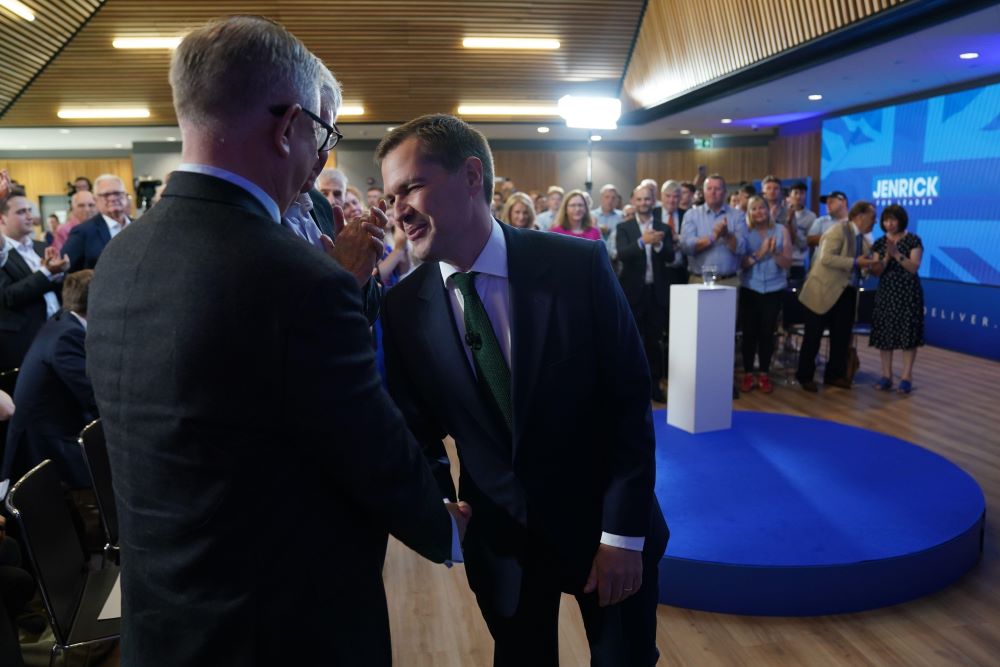Civil War Boffin Robert Jenrick Hopes His Tory Right "Revelation" Takes Him To Victory
9 min read
Unashamedly provincial in his background but now with multi-million-pound properties, taking the battle to Ukip and now Reform, and trying Ozempic but turning to running along the Thames to keep fit.
Ex-immigration minister Robert Jenrick has doubters over his apparent ‘conversion’ to the right, but wins plaudits for representing Conservative values.
The biography
Robert Jenrick, 42, grew up in Herefordshire and Shropshire, going to the independent fee-paying Wolverhampton Grammar School – paid for by his grandmother, using a life insurance payment after the death of his grandfather. His father Bill was a gas fitter who left school at 16 for an apprenticeship, and his mother Jenny worked as a secretary. As children, Jenrick and his sister, Jane, would earn pocket money by polishing the brass on the fireplaces in his father’s shop. Bill, aged 84, still goes to his office every day and works full time running his fireplace business. Jenrick often helps out now that his dad is older, providing business advice.
In 1997, following Tony Blair’s landslide victory, Jenrick joined the Conservative Party at 16 years old. He studied history at St John’s College, Cambridge – the first generation of his family to attend university – where he gained a first-class degree in history, meeting his future ministerial boss Suella Braverman at freshers’ week. At the time Jenrick wrote for the student newspaper Varsity and, aged 19, when asked what he would like to be in 10 years’ time, replied: “A millionaire businessman fighting my first election to Parliament.” That he did, arriving in Parliament aged 32, just a few years behind schedule.
On graduating, Jenrick trained as a lawyer in Birmingham, moving back home with his parents to save money while he qualified, after which he spent a year studying political science at the University of Pennsylvania. Working for firms Skadden and Sullivan and Cromwell, in London and Moscow, Jenrick later moved into business, becoming an international managing director of the auction house Christie’s. A friend says: “He didn’t particularly enjoy his time as a corporate lawyer. Rob’s very entrepreneurial and it didn’t necessarily suit that, unlike Christie’s where he loved making deals.”
The only reason Rob kept his seat is because he squeezed out the Reform vote
In 2010, he stood as the Conservative candidate for Newcastle-under-Lyme, losing to the Labour incumbent despite increasing the Tory share of the vote. But Jenrick didn’t have to wait long as a by-election came up in Newark in 2014, prompted by the resignation of Conservative Patrick Mercer over a cash-for-questions scandal. He won, seeing off a Ukip challenge at a time when that party was polling well.
It was the first Tory hold in a parliamentary by-election while in government since 1989, when future leader William Hague took Richmond, in North Yorkshire. He has since served in the government of each of the last five Conservative prime ministers. Climbing the ladder, in the summer of 2019, Jenrick questioned future prime minister Boris Johnson for an hour at his London house, alongside Rishi Sunak and Oliver Dowden, eventually putting their names to a joint piece for The Times on why “only Boris Johnson can save us”.

Just 18 months later, when Johnson took over, Jenrick was promoted to housing secretary, making him the youngest member of the cabinet. He was later sacked from the job after overruling a planning decision in a way that benefited businessman Richard Desmond, who later donated £12,000 to the Conservatives.
Sometimes dubbed ‘Robert Generic’ by his colleagues, for what was regarded as centrist positioning, he was brought back into government as immigration minister but resigned last year, claiming to have realised that the Rwanda plan would not work unless Sunak took a tougher line with the courts and the European Convention on Human Rights.
The pitch
Jenrick’s hardline position on immigration won over those like Neil O’Brien – once a close ally of Badenoch, now helping Jenrick develop his immigration piece – who think the issue existential for the party.
He has made an explicit pledge to leave the European Convention on Human Rights and a commitment to cap net migration at tens of thousands a year.
His core support lies on the right of the party – backers include Danny Kruger and John Hayes – but he has won endorsements from some considered closer to the centre, like Edward Argar and Victoria Atkins.
Jenrick believes he can repeat his own by-election success in seeing off a threat from the right flank, whether Ukip in 2014 or Reform now. However, it took him some time to make his mind up on what should be done with Nigel Farage: in May he said he would have “no problem” with the Reform leader joining the Tories, or “working with him”, but Jenrick has since rowed back, saying he wants to put him “out of business”.
“The only reason Rob kept his seat is because he squeezed out the Reform vote, and it was spurred by his resignation,” one supporter says.
The Newark MP told ConservativeHome that this summer he “spent every waking hour in Newark and Nottinghamshire trying to get myself re-elected”. But he made visits to constituencies, including Gainsborough, Mid Bedfordshire, North Cotswolds, Mid Derbyshire, and Finchley and Golders Green, among many others, to assist colleagues with their re-election, which is paying dividends now he is looking for support.
He doesn’t like London particularly much; he isn’t wild for the London way of living
He even found time to fly to meet Canadian Conservative Party leader Pierre Poilievre in Ottawa, drawing inspiration from the party’s success in rebuilding the party with messages on low immigration and high growth.
As Jenrick remarked in his maiden speech, in Westminster “there are, after all, no final victories in politics; all achievements, however hard won, can be and are undone”.
The hinterland
Besieged by parliamentarians three times, each unsuccessful at getting into the royalist stronghold, Newark played a pivotal role in the English civil war. Prince Rupert, who raised the first siege himself, is a particular hero of history buff Jenrick.
Some supporters might jokingly refer to their man as “Bobby J” in reference to the US inflection of some of his pitch, but the man is steeped in Englishness – and the history of the civil war in particular. An advocate of ‘English votes for English laws’ at the time of his selection, Jenrick was writing a book on the subject when the Newark seat came up.
The book remains unfinished, says a friend. “What with becoming an MP and having a family it has been placed on pause. But Rob had started it and really is a voracious reader of the civil war.” He secured funding for Newark Castle to have an education centre to explain the conflict.
 Robert Jenrick and his wife Michal Berkneron (Alamy)
Robert Jenrick and his wife Michal Berkneron (Alamy)
While working at Christie’s auction house, he met his wife, Michal Berkner, an Israeli-born Jewish-American lawyer nine years his senior. Together, they have three daughters, whom they are raising to honour both their Jewish and Christian heritages. Of his home, a friend says: “It is a girls’ house, plus Rob. He is fond of using the Arabic phrase Abu el Banat, meaning father of daughters.”
“Michal wears the trousers,” say some observers. One Tory MP remembers Berkner remarking that “it is every man out for themselves” during a previous leadership election. Another says she “lets Rob play at politics”. Berkner, however, is clearly signed up in full, even travelling to a leadership event in Devon on his behalf. The couple went to Conservative Party Conference the day after they got married.
They own multiple homes including the Grade I-listed Eye Manor near his constituency which, at the time of his first by-election, Jenrick said he was “almost sure” they would sell, and a London townhouse in the politically fashionable Vincent Square where his neighbours include fellow Conservative colleagues.
“He doesn’t like London particularly much; he isn’t wild for the London way of living. ‘Unashamedly provincial’ is what he says,” according to one of Jenrick’s supporters. He got in trouble during the Covid pandemic, appearing to break lockdown rules by visiting his parents in Shropshire as well as travelling between his London and Herefordshire homes.
Entering Parliament through a by-election, Jenrick often gathers similar victors in a little ‘by-election gang’ to provide support after going through a different process to most colleagues.
His first successful electoral experience even made him consider what is not a classically Conservative policy of lowering the voting age, tweeting at the time: “Evening with 16/17-year-olds who helped in Newark by-election – hard to deny lowering voting age when you meet these guys.”
Jenrick has been positioning himself well during the leadership election, even adjusting his image, trying weight loss drug Ozempic (but only for six weeks) and embracing “a very right-wing haircut”, according to his colleagues. Most of the weight loss, a friend says, is from regular running, monitoring his laps on the fitness tracking app Strava, along the Thames and round St Paul’s.
What others say
Lord Eddie Lister, formerly Boris Johnson’s Downing Street chief of staff, first got to know Jenrick at the tail end of his tenure as chairman of Homes England and, during the pandemic, had regular contact over local restrictions.
“I was impressed by him on the housing staff to start with. He did get it. He did understand the problems that people were facing. He did want to increase housing,” Lord Lister says. “The trouble was … I don’t think a lot of his colleagues particularly wanted some of those reforms.”
He adds: “Robert displayed conservative values. He wanted home ownership, he wanted to build, he wanted opportunity.”
It wasn’t so much a conversion as a revelation
A friend adds: “He is not afraid to argue his case. He was at the sharp end over immigration but he’s not an extremist, he is a very balanced guy. Most people who have had to deal with the same issue have come to similar conclusions.”
Some within his party refer to it as Jenrick’s Damascene conversion to the right. One MP close to Jenrick at the time says it was not quite so stark – and that Jenrick was “fighting tooth and nail” during meetings with the then home secretary over immigration: “Being in the Home Office and seeing what you’re up against can evolve your position, and often it can happen quite quickly as the severity hits you.
“It wasn’t so much a conversion as a revelation.”
But one senior colleague is still suspect, of both Jenrick and Cleverly: “All of a sudden Remain-backing Jenrick is the bastion of the right and Brexit-backing Cleverly is the One Nation candidate. I don’t know if they’re just cross-dressing or if they’ve fully transitioned.”
As one former Conservative MP puts it: “Rob would only have wanted to win his seat if he had a big role to play afterwards.”
